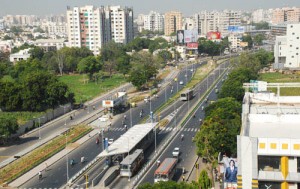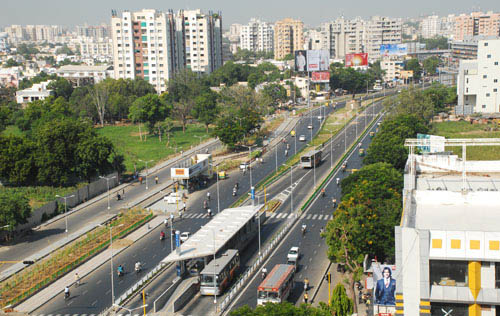By: Ravi Sinha
 Track2Realty Exclusive: If regulatory changes have been a cause of concern for the developers in the Gujarat real estate market, the political uncertainty prior to the general elections definitely threatens to prolong the slump in the realty market. Elections and real estate have a symbiotic relationship where elections bring a kind of stasis that is unproductive.
Track2Realty Exclusive: If regulatory changes have been a cause of concern for the developers in the Gujarat real estate market, the political uncertainty prior to the general elections definitely threatens to prolong the slump in the realty market. Elections and real estate have a symbiotic relationship where elections bring a kind of stasis that is unproductive.
The business that is too dependent on the power corridors for each and every clearances and NOCs is always conscious of the paradigm shift in the policies if a new government takes charge. The general elections of 2014 hold more significance for the sector for reasons more than one.
The sector that has been looking anxiously at the formation of next central government and its policies with reference to the pending bills like regulator bill and land acquisition bill is rather more worried with the emerging corridors of uncertainty at the political level.
The sector is also conscious of the fact that any policy advocacy for rationalisation of the bills holds no ground if an unstable government comes to power. Also with the Gujarat Chief Minister Narendra Modi himself a Prime Ministerial candidate the Gujarat real estate is curiously waiting for the outcome of the next Lok Sabha polls.
How big is the impact of next Lok Sabha elections on the real estate sector can be assessed by the fact that the Gujarat Inc in general that operates on a macro level economic factors borne out of policies is more bothered about economy than polity, whereas the micro market business of real estate that by and large is governed by the local laws and bylaws is more worried with the possible political scenario to emerge post the upcoming general elections.
Moreover, with the economy continuously sliding down and the prospect of an unstable government not being in a position to stem the rot, analysts believe in the short term there won’t be any significant impact on the sector.
That may be the reason why Anshuman Magazine, CMD of CBRE South Asia believes the sector should not bother too much about the outcome of elections at this point of time since the sentiments in the market are any way down. According to him, had there been a 2007 market with sentiments bullish there was reason to be concerned as any policy delay would have adversely affected the business. But today, when in any way there is an element of uncertainty with economy and with the outcome of the elections, may be it won’t affect as much.
“Frankly, I don’t think the political outcome of the elections should worry the sector as business goes on irrespective of which government comes to power. Of course, a stable government means fast track policies but at this moment I feel more than the government it is the market forces that is keeping the sentiments down and the impending elections are only keeping the developers anxious. But I don’t see any significant impact during and after elections as far as the fortunes of the sector are concerned,” says Magazine.
Generally, the decision process is slow during the election period and majority of the key players of funds study the market, get their base strengthened and bring in money in a big way once a stable government comes into power. Realty analysts otherwise are unanimous that this is not a normal election year where the sector will wait to see who is elected and gauge how that will affect their business, work, benefits, etc.
This time it seems to be different, and it is having a very large affect. This is because the economy is the largest issue on voters’ minds, which makes it the most important topic for voters and anyone running for election/re-election. The housing sector is seen to be the key to the economy, if it goes up so will the economy.
Manan Choksi, Regional Owner RE/MAX Ahmedabad, on the contrary, believes that the General Elections may bring windfall gains for Gujarat property market. According to him, that Gujarat property market has been slow because of regulatory changes and slow economy. In election year there is a big circulation of money as political parties spend huge sum of money in publicity.
“In fact as the PM candidate is from Gujarat and hence the government is set to show a lot of progress in this state. So, there is a fair chance that the Gujarat property market may perform better than before in the election year. Elections and politics directly affect the sentiments which indirectly affect the property prices. So the number of transactions suffers when the politics are unstable. Major investments have slowed down due to country wide policy paralysis. That will continue in election time. However, post election irrespective of which party comes to power, investments will flow in,” says Choksi.
Anuj Puri, Chairman, CII WR Infrastructure, Real Estate & Construction Sub-Committee admits that the outcome of the general elections would definitely have some bearing on whether the market will pick up speed, continue at the current pace or slow down. The reason is that the political stability and proactive reforms that can come on the heels of a general election can render the real estate market more conducive to growth. In other words, the results of polls can therefore have a direct bearing on market sentiments.
“Important regulations related to the real estate sector are still hanging fire and awaiting full approval and implementation. The government is aware that these moves are crucial for the sector’s growth, which is hard-wired into the country’s overall economic growth as well. I am confident that the dire need for seeing these regulations through is recognized and acknowledged in the right quarters. The delays may be because every industry angle has to be considered in such regulations so that they are not overly skewed or draconian towards any side, but holistically oriented towards growth,” says Puri.
Given the fact that the political climate is election driven much in advance this time, it raises two schools of thought in the real estate market. Firstly, the prolonged political uncertainty will cause caution and hesitancy in the sector beyond a traditional election. Secondly, with the election mood so much in advance the marketplace will absorb the thought of an election and its likely impact much more easily.
Five years after the real estate slowdown, if not outright crash, there is much unfinished business regarding the restoration of Gujarat’s real estate market for the government to tackle, regardless of party alliances or spectrum that takes charge of the government. It is not just the next government’s economic policies that will be a key driver of the health of real estate, but the new government’s policies with respect to the pending realty bills in the Parliament will also decide whether the houses will be affordable or the supply side constraint borne out of new policies will kill the golden goose that promises to contribute significantly to the state GDP.
In any case, the new government has a couple of real issues of real estate to address, and that is what keeps the sector guessing as of now. Elections or no elections, developers are always dependent on the authorities, who give approvals. Gujarat real estate market this time around has an altogether different reason to smile even though being caught between the regulatory changes and corridors of uncertainty. And the prospect of Prime Minister from the state brings smile on their lips.





